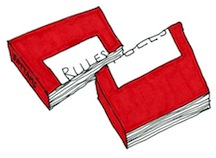 Order is a process that effectively and efficiently allows you to scale up to a higher level.
Order is a process that effectively and efficiently allows you to scale up to a higher level.
Bureaucracy is a process that fails to work, that is inflexible, that destroys value instead of creating value. Bureaucracy is when processes become a mindless, unthinking application of rules and procedure with no understanding of the overall goals or how your actions affect others. Bureaucracy results in gridlock and occurs when no flexibility is designed in, or authority given to adapt to changing conditions.
Bureaucracy can occur when an originally well-designed system becomes obsolete, usually due to some combination of internal breakdown or external change.
Chaos is the opposite of order and can develop when “empowerment” occurs without proper training, understanding, goals, feedback, or guidelines.
To intelligently break the rules, you must fully understand the purpose of the rules. To effectively think outside the box, you must know the box intimately.
Example: During the Vietnam War an Army captain called down an airstrike on his own position, no doubt a violation of every rule in the book. Why? Because his position was overrun by the enemy, he and his men were goners anyway, and this way they might take more of the enemy with them and still have a chance to survive. He “broke the rule” in order to achieve the underlying purpose of the rule (see note).
NOTE: During a 1966 battle on the Kontum plateau in the Vietnam Central Highlands, Captain Carpenter and his infantry company were pinned down by North Vietnamese. With no retreat possible, Carpenter called down an air strike on his own position. “We might as well take some of them with us,” he radioed to his battalion command post. The napalm attack injured seven of Carpenter’s men, yet enabled the unit to consolidate and later withdraw. “Napalm Bill” Carpenter won a Distinguished Service Cross for his actions. Carpenter, 47, was promoted to major general and put in command of a newly-organized light infantry division at Fort Drum, New York.
Closing quotes:
“Rules are for the guidance of the wise and blind obedience of fools.” — Solon, Lawmaker of Athens; died 559 BC
“Rules are mostly made to be broken and are too often for the lazy to hide behind.” — Gen. Douglas MacArthur, Supreme Commander of Allied Forces, Southwest Pacific Area, during World War II; 1880-1964
“Two things can happen if you disobey a direct order. You get a court marshal or you get a medal.” — U.S. Marine drill sergeant


0 Comments